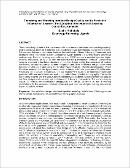| dc.contributor.author | Bashir, Kishabale | |
| dc.date.accessioned | 2023-06-02T12:20:09Z | |
| dc.date.available | 2023-06-02T12:20:09Z | |
| dc.date.issued | 2021 | |
| dc.identifier.citation | Kishabale, B. (2021). Theorising and Modeling Interface Design Quality and Its Predictive Influence on Learners' Post Adoption Behaviour in E-Learning Course Environments. International Journal of Education and Development using Information and Communication Technology, 17(1), 100-122. | en_US |
| dc.identifier.uri | https://hdl.handle.net/20.500.12504/1368 | |
| dc.description.abstract | The current study, guided by the cross-sectional survey method, assessed interface design quality,
and its predictive ability on E-learners’ post-adoption behavior in E-learning course environments.
DeLone and McLean’s Information Systems Success Model, Khan’s E-learning Framework, and
Bhattacherjee’s Information System Continuance Model formed the current study's theoretical
underpinning. Data for the study were collected from 232 E-learners in selected Ugandan higher
learning institutions, using a 38-item self-administered questionnaire. Principal Components
Analysis produced a four-factor structure of interface design quality that comprised of content
interactivity, accessibility design, system navigation, and visual-aesthetics design, which were
found to be valid and reliable using Confirmatory Factor Analysis. The Structural Equation Model
fit indices revealed that the hypothesised model achieved adequate goodness-of-fit to the data.
Regarding the structural relationships, the four factors were found to be statistically significant
predictors of E-learners’ satisfaction; and in-turn, satisfaction impacted learning agility. The results
have clearly aligned with the study's theoretical framework, buttressing existing empirical data on
interface designs and end-user post adoption with E-learning interventions. The current study is
crucial for making evidence-based pedagogical and design decisions by key E-learning
stakeholders for the successful implementation and continued use of digital learning solutions in
higher education contexts. | en_US |
| dc.language.iso | en | en_US |
| dc.publisher | International Journal of Education and Development using Information and Communication Technology | en_US |
| dc.subject | User interface design | en_US |
| dc.subject | Structural equation modeling | en_US |
| dc.subject | Satisfaction | en_US |
| dc.subject | E-learning course environments | en_US |
| dc.subject | Accessibility | en_US |
| dc.subject | Visual-aesthetics | en_US |
| dc.subject | Learning agility | en_US |
| dc.subject | Uganda | en_US |
| dc.title | Theorising and modeling interface design quality and its predictive influence on learners’ post adoption behaviour in e-learning course environments | en_US |
| dc.type | Article | en_US |

